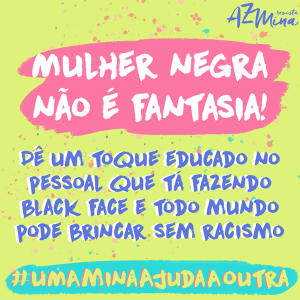“If you can help a drunk girl out of a potential dangerous situation, or a lesbian couple who are being target as entertainment, do so.”
Every February, Brazil is in full festive mood with its carnival; bringing music, drinks, costumes and street parties all over the nation. In the height of the Brazilian summer, carnival is, for many, a celebration where “anything goes” – and in an already strong macho-driven culture, these elements have become an excuse for sexual assault on women.
In response to this, AzMina, a Brazilian feminist magazine and institution, created a campaign encouraging women to combat assault and protect each other during the carnival. The IPF spoke with the Director, Letícia Bahia, about the campaign and the work they are doing.
“Last year’s campaign, #CarnavalSemAssedio (Carnival Without Assault), focused on educating men about the difference between flirting and assault,” Letícia explained.
“This year we wanted to continue with the theme, but focusing on women helping each other out.”
Therefore, this year the campaign is called #UmaMinaAjudaAOutra (One Girl Helps Another). Through a partnership between AzMina and digital news website, Catraca Livre, the campaign focuses on sisterhood and calling out assault, as well as racism and homophobia.
According to research conducted by ActionAid, 86% of Brazilian women have been assaulted in public areas. With carnival celebrations in full swing, this problem is likely to increase during the festivities.
Letícia said: “If you can help a drunk girl out of a potential dangerous situation, or a lesbian couple who are being target as entertainment, do so.”
AzMina has tied the campaign together with journalism by publishing articles about their readers’ experiences, as well as exploring issues such as racism and violence against women in Brazil. They have also created a samba song about consent called Se Você Quiser (If you want to), bringing the true rhythm of the Brazilian carnival to the campaign.
“The campaign is a entry point on the topics that we cover – and the journalism is a ‘find out more’ element, and a creative way to talking to people. I like it and find it to be an innovative mix of doing journalism.”
A strong part of the campaign is the hashtags and memes used online. Letícia explained they use a pop aesthetic, and that the campaign is not only meant for self-proclaimed feminists, but also for the media and general public.
“I believe that a colourful campaign invites people who are still scared of using the word ‘feminism‘. It is inviting a conversation to women for women.”
AzMina was created by women who did not identify with regular women’s magazines. They wanted a diverse platform, where they could talk about politics, as well as fashion – but in their own way.
“Our main objective is to create independent journalism and to build partnerships with platforms like Catraca Livre, however, a big part of our work is voluntary.”

“A black woman is not a costume! In an educated manner, call out the person who is doing black face and everyone can play without racism.” [Image credit: #UmaMinaAjudaAOutra]
“We give educational talks and trainings to companies on topics such as gender identity. However, we keep the magazine away from brands and advertisements so that we can create the independent journalism we want.”
To find out more about AzMina, visit their website, follow them on Twitter and like them on Facebook.

